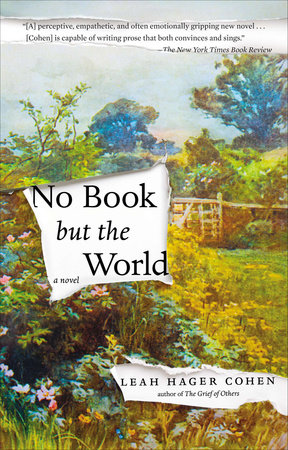READERS GUIDE
Questions and Topics for Discussion
INTRODUCTION
At the edge of a woods, on the grounds of a defunct “free school,” Ava and her brother, Fred, shared a dreamy and seemingly idyllic childhood-a world defined largely by their imaginations and each other’s presence. Everyone is aware of Fred’s oddness or vague impairment, but his parents’ fierce disapproval of labels keeps him free of evaluation or intervention, and constantly at Ava’s side.
Decades later, then, when Ava learns that her brother is being held in a county jail for a shocking crime, she is frantic to piece together what actually happened. A boy is dead. But could Fred really have done what he is accused of? As she is drawn deeper into the details of the crime, Ava becomes obsessed with learning the truth, convinced that she and she alone will be able to reach her brother and explain him-and his innocence-to the world.
Leah Hager Cohen brings her trademark intelligence to a psychologically gripping, richly ambiguous story that suggests we may ultimately understand one another best not with facts alone, but through our imaginations.
ABOUT LEAH HAGER COHENLeah Hager Cohen is the author of four nonfiction books, including Train Go Sorry and Glass, Paper, Beans, and three novels, most recently House Lights. Among the honors her books have received are selection as a New York Times Notable Book (four times); American Library Association Ten Best Books of the Year; and a Booksense 76 Pick. She is a frequent contributor to the New York Times Book Review.
DISCUSSION QUESTIONSWhat do you think of June and Neel’s ideas about child development and education and how do they impact Ava and Fred individually? What do you think of the family’s decision not to have young Fred evaluated? How might his life have been different-for better or for worse-if he’d been given a diagnosis as a child? Would the family have been changed by it? Would he?Sibling relationships are bound to change over time as a shared childhood evolves into separate individual adult lives. Discuss this evolution in terms of Ava and Fred. They are unusually close as children. When does their relationship start to change and what causes this change? Was their drifting apart inevitable?How does the relationship between Fred and Ava compare to the relationship between Dennis and Kitty? Would you say the contrasts come down to the differences between their parents, or their differing personalities, or the fact that Fred is different? How do the sibling relationships in your own family compare to the evolving relationships portrayed in No Book but the World?Through the story of Fred, the book implicitly asks to what degree a family is responsible for the actions of its members. Are Fred’s parents responsible for his actions as child? What about as an adult? Is Ava in any way responsible, or obligated to help him, when he gets into trouble? How would she answer this question?Near the beginning of the No Book but the World, Ava writes, “I must be vigilant against making this a story.” What is she afraid will happen if she dares to compose a narrative that explains her and Fred’s childhood?Ava and Kitty are best friends yet there is also tension in their relationship. What are some signs of this tension in their very first meeting, when Kitty’s family is just moving into the Art Barn? How does the introduction of Kitty to the picture change the dynamic between Fred and Ava? How does it change Ava as a person?Did your own perception of any of the characters, Ava included, change over the course of reading No Book but the World?Dennis and Ava have a loving but curious-seeming bond-at least to those outside their marriage. Kitty thinks of their relationship as “careful, modest, polite. Almost enacted, rather than messily lived.” Why do you think Dennis and Ava chose each other? Do you think Kitty is right? Do you think it’s ever possible for someone who’s not actually in the relationship in question to understand fully or fairly what that relationship is about?We eventually learn that several people might have played roles in Fred’s winding up in jail, whether they sought actively to exploit him or simply neglected to be responsible enough, thoughtful enough, kind enough, about what he had, what he lacked, and who he really was. Whose name would you put on this list? If you were to organize the list from most culpable to least, whose name would appear at the top?An epigraph at the opening of No Book but the World quotes lyrics by María Irene Fornés: I know everything. / Half of it I really know, / The rest I make up. / The rest I make up. At the end of the novel, we learn that Ava has made good on this promise. How did you feel when you found this out? Did you feel misled, duped? Could you understand why she felt the need to do it? Does it ever serve a moral good to pretend, to fabricate? Does making up stories ever help us extend our humanity to do so?

